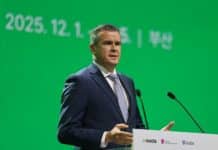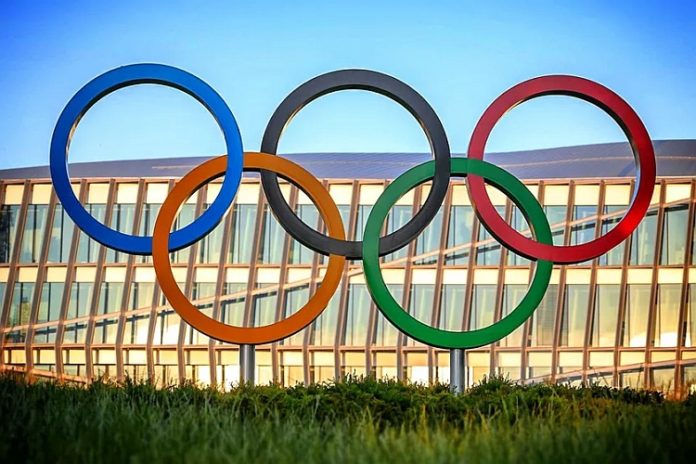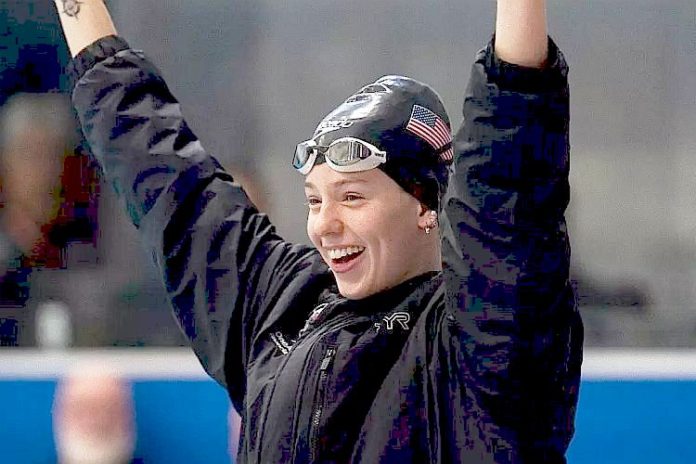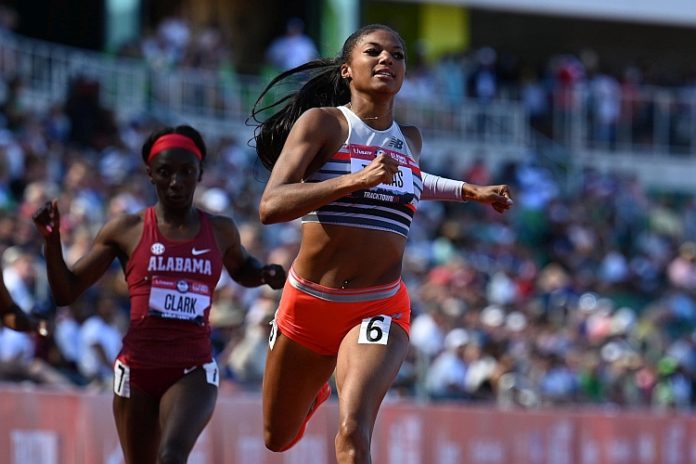★ The Sports Examiner: Chronicling the key competitive, economic and political forces shaping elite sport and the Olympic Movement.★
★ To get the daily Sports Examiner Recap by e-mail: sign up here! ★
≡ ATHLETES, OLYMPICS & MONEY ≡
Contrary to what you might have heard, the International Olympic Committee pays athletes, in fact, quite a few.
In the 2021-24 quadrennial, the IOC’s Olympic Solidarity Program had 1,560 Olympic Scholarship holders for summer sports – including Paris 200 m gold medalist Letsile Tebogo of Botswana – from 95 countries, who received direct payments. Of these, 599 actually made it to the Paris Olympic Games; the IOC also supported 364 winter-sport athletes from 77 National Olympic Committees and 226 teams from 142 NOCs for a total of 2,150 recipients, at a total cost of $17.660 million in 2024 alone.
So, why shouldn’t the IOC pay all of the athletes who make it to the Games?
Good question, which many people have been asking for a long time.
Truth be told, it might be time now.
¶
There have been cogent reasons for the IOC not to pay athletes, especially for winning medals.
Let’s remember that we are talking about the Olympic Games, which did not start with Pierre de Coubertin (FRA) in 1894, but in ancient Greece. In those days, the Greek city-states were the ones who sent their home champions to represent them at Olympia.
If they won, they were rewarded by their own people. So, it has been with the modern Olympic Games, in which National Olympic Committees – also created in 1894 – are the ones paying medal winners. A CNBC list concerning the 2024 Paris Games showed a gold-medal winner from Hong Kong would get the equivalent of $768,000 U.S., and a gold-medal-winner from Singapore would get $745,000, and so on. The U.S. Olympic & Paralympic Committee, which had 40 gold-medal winning individuals and teams in 2024, paid $37,500, $25,000 and $12,500 for gold-silver-bronze winners.
That system, with echoes of the ancient Games, has been around for a long time. Former IOC chief Thomas Bach (GER) has noted that he and his teammates on the winning men’s Team Foil squad from Montreal ‘76 received bonus payments from the German Olympic body.
More recently, one International Federation – World Athletics – entered the fray, paying $50,000 to the Paris gold medalists, with federation chief Sebastian Coe (GBR) promising that all medalists would receive prize money at the 2028 Olympic Games.
This was roundly criticized by other International Federations prior to Paris 2024, and by Bach, who said the role of the federations is to use the millions they receive from the IOC as a share of Olympic television revenues for sport development instead of paying medalists. And, many (most) of the IFs already pay prize money for their world championships.
Further, the IOC, as evidenced by the comments of the candidates from the Presidential election in March, sees the Olympic Games far differently: as a development vehicle. In his introduction to the IOC’s 2024 Annual Report, Bach observed of the successful Paris 2024 Games:
“The Games not only provided a platform for the next generation of Olympians – they also embodied the spirit of the Olympic Movement, encouraging more young people to embrace sport and the Olympic values. …
“Our commitment to solidarity and equality remains at the heart of everything we do. Through Olympic Solidarity, we continued to provide essential funding and support, ensuring every talented athlete has the opportunity to pursue their Olympic dream. In Paris, we saw 91 NOCs win medals, proving that the Olympic Movement is creating a fairer and more inclusive playing field. We are also happy and proud that not only did the IOC Refugee Olympic Team participate with a record 37 athletes in Paris, but that Cindy Ngamba made history by winning the team’s first-ever Olympic medal.
“This is only possible because of our unwavering commitment to reinvesting in sport. Over the past Olympiad, we distributed an average of USD 4.7 million every single day to support athletes and sports organisations. This solidarity-driven model ensures that the Olympic Games remain an event for the world, by the world.”
So much for big-money payouts from the IOC to Olympic medal winners.
¶
But there is another approach, fully in line with the IOC’s development goals and its desire to create incentives for youth to get involved in sport.
Olympic honoraria.
Paying medal winners big prize money would, in many cases, simply pile on more rewards to those who already have them.
But why not pay a reward to all athletes who participate in the Olympic Games?
● This treats all athletes from all National Olympic Committees equally, and offers a demonstrable, tangible reward for qualifying and competing in the Olympic and Winter Games.
● The IOC can certainly afford it. Consider that a $10,000 honoraria paid to the 10,813 athletes at Paris 2024 and the 2,900 expected for Milan Cortina 2026 would cost a total of $137.13 million.
The IOC’s recent annual revenues, from its financial statements show that amount would not significantly impact any of the last four years:
● 2021: $3.107.4 billion
● 2022: $2,339.0 billion
● 2023: $1,122.5 billion
● 2024: $4,621.3 billion
The Sports Examiner review of the IOC’s revenues and expenses indicated that over the 2021-24 quadrennial, the IOC spent 74% of its revenues on the Olympic Games and the Olympic Movement, with the other 26% going to administrative costs and reserves (which were $4.880 billion as of 31 December 2024).
● As for the future, the 2024 IOC Annual Report noted that revenues from 2021-24 reached $7.7 billion and “USD 7.5 billion has already been secured for 2025–2028, with a further USD 6.9 billion secured for 2029–2032 and USD 4.0 billion for 2033–2036.”
So, why not expand an Olympic honoraria to a four-year grant of $10,000 per year as long as the athlete continues competing and follows the anti-doping and other eligibility rules?
That would cost $548.52 million over four years, easily within the IOC’s financial capabilities.
¶
Why not? It’s not the ancient Greek way, but we’re in the 21st Century now, and not de Coubertin’s 19th or 20th either.
The IOC is already paying athletes – more than 2,000 scholarship holders – and it’s time to make a gesture to Olympians as well, summer and winter. If the IOC wants to increase interest in the Youth Olympic Games, those too.
Bach’s IOC saw its revenues and reserves expand greatly. Under new chief Kirsty Coventry (ZIM), it’s time to spend some of that money – in equal measures – on those who have made it to the Olympic Games.
Rich Perelman
Editor
★ Receive our exclusive, weekday TSX Recap by e-mail by clicking here.
★ Sign up a friend to receive the TSX Recap by clicking here.
★ Please consider a donation here to keep this site going.
For our updated, 699-event International Sports Calendar for 2025, 2026 and beyond, by date and by sport, click here!



























